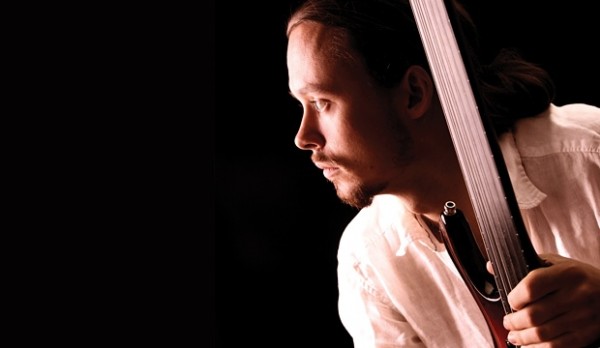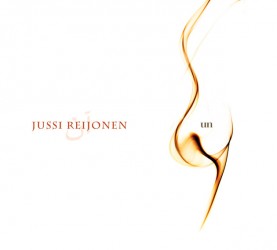Jazz Review: The Jussi Reijonen Quartet — Fascinating Eclecticism
The Jussi Reijonen Quartet (Juan Perez Rodriguez, piano; Bruno Råberg, bass; Fabio Pirozzolo, percussion). At the Amazing Things Arts Center, Framingham. MA, August 31.
By Michael Ullman
Jussi Reijonen, a guitarist (fretless and fretted) who is equally adept on the ancient lute-like instrument the oud, was born in Finland on the edge of the Arctic Circle. But he was raised, as he told us at the Amazing Things Arts Center, in a succession of places, including Lapland, Lebanon, Jordan, Tanzania, and Oman, countries where his father helped to set up communication grids. Reijonen’s eclectic and spacious approach to jazz is a deliberate attempt to investigate, not necessarily fuse, those disparate roots. In Boston he studied with the inestimable pianist Ran Blake, who has dedicated his career to merging different genres, and with guitarist Mick Goodrick, whom I have heard denouncing guitarists who play too many notes.
Reijonen must have taken both mentors to heart. He is not whimsically multicultural. His music came out of his experience of, as he put it, “an adulthood spent wondering where I am really from and where my roots are.” “For years,” he continued, “I have been trying to find answers to why all these seemingly disparate sounds pull me towards them so strongly.” His most recent answers can be found on the disc un (Unmusic CD01), which he celebrated at the Saturday night concert. There are wide spaces and occasional silences in Reijonen’s music, calm interludes that he attributes to the openness of the Nordic world of his childhood. There are also chattering improvisations and chilly tremolos on Arabic scales over prolonged ostinatos in the bass.

Guitarist Jussi Reijonen — he attributes the spaces in his music to the openness of the Nordic world of his childhood
In the pleasant performing space at the Amazing Things Arts Center, a converted fire house, the concert started with what sounded like a few noncommittal taps on a frame drum by percussionist Pirozzolo. Instead of a traditional jazz drum set, Pirozzolo played a variety of handheld drums and whacked at a couple of small cymbals and chimes. He sat on a resonant box called the Cajon, which he struck with his palms, making sounds that varied from a conga-like resonance to a more woody, crackling sound. His initial, mildly stated strokes became a rhythmic pattern that bassist Råberg mimicked, soon joined by Rodriguez playing a single note in unison with the bass. Over this quiet, slightly obsessive background, Reijonen entered with a slow rendition of John Coltrane’s famous early ballad, “Naima.” Bending notes languorously, he improvised in an airy, otherworldly way that produced as tender a rendition of “Naima” as one could imagine.
Reijonen switched to oud, whose strings are plucked by a wand held in the fist, for “Bayatiful,” a rhythmically active piece based on Arabic scales. The main theme seemed divided into two parts, but then there was a relaxed, lyrical middle section whose harmonies were more familiar to this listener. Live, energized by two new members of the quartet (Rodriguez and Pirozzolo), this piece became more intense than on the recording. Reijonen said he composed a later number, “Serpentine,” at a period when he was angry. He called it a flamenco rumba. In Framingham it evolved into a legitimate flamenco number when the pianist, a Spaniard with wide experience in flamenco, sang in the curiously expressive, nasal manner of the flamenco style, with its bent notes, extravagant vibratos, and wailing intensity. Reijonen closed this fascinatingly varied, beautifully performed, and highly personal evening of music with what he called a ‘lullaby” for taxpayers: a duet between guitar and bass on a Finnish tune, Nuku Sie.
(The Jussi Reijonen Quartet will also be performing at The Buttonwood Tree Performing Arts & Cultural Center in Middletown, CT on October 27, and at Dimensions in Jazz @ Woodfords Church, Portland, ME, on December 13.)
Michael Ullman studied classical clarinet and was educated at Harvard, the University of Chicago, and the U. of Michigan, from which he received a PhD in English. The author or co-author of two books on jazz, he has written on jazz and classical music for The Atlantic Monthly, The New Republic, High Fidelity, Stereophile, The Boston Phoenix, The Boston Globe and other venues. His articles on Dickens, Joyce, Kipling, and others have appeared in academic journals. For over 20 years, he has written a bi-monthly jazz column for Fanfare Magazine, for which he also reviews classical music. At Tufts University, he teaches mostly modernist writers in the English Department and jazz and blues history in the Music Department. He plays piano badly.
Tagged: Amazing Things Arts Center, Bruno Råberg, Fabio Pirozollo, Juan Perez Rodriguez, Jussi Reijonen, Jussi Reijonen Quartet, Michael Ullman, Oud

